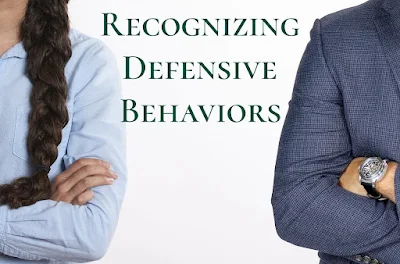People often resort to defensive behavior when their beliefs are challenged, instinctively guarding against perceived threats to their self-image. Unconsciously, people might employ dismissive remarks or deflective humor to shield themselves from criticism or vulnerability. In social settings, some may engage in preemptive justifications to ward off potential judgment. Subtle body language cues, like crossed arms or defensive postures, can also manifest as protective mechanisms during interactions.
Now I'll list 6 defense mechanisms most people use daily, some without knowing they are defensive actions.
1. Denial
Sometimes an event or circumstance is so incredibly devastating, we just tune it out, and don’t even know we’re doing it. You can become aware of your denial when other people around you call something to your attention.
2. Repression
This is sort of like denial, but it involves burying a thought of feeling deep inside, where it tends to come out in other ways. For example, you could be furious at your boss, and unable to release your anger at work, become vitriolic and argumentative at home.
3. Projection
It’s often easier to ignore our own faults, and pretend like other people have them instead. Projection involves seeing something bad in other people, which may or may not be there (like a negative character trait) when really, you are exhibiting that same trait.
4. Rationalization
This one involves taking a wrongdoing (by you on others, or from others onto you) and reasoning it out to be okay. You’ll have to create a complex new system of logic in order to work this one into the universe in an acceptable way, but all sorts of crime from embezzlement to genocide have been rationalized as acceptable.
5. Regression
Regression basically involves taking a step back developmentally, to a space where it’s physically or emotionally safe. Children often regress as they move through life, going through periods where they revert to acting like a younger child. Adults may also undergo this process. For example, after getting fired from a job, you may revert to the safety net of looking for a comparably paying job, instead of searching for something better.
6. Reaction
Sometimes the primal instincts take over, and we get ready to fight. In situations that don’t have a lot of time around them, you can quickly jump into a reactionary mood before reflecting and calming down...for example, if someone cuts you off in traffic, you could step into a mode of road rage; or, if someone argues with you at work, you could quickly defend yourself by escalating the situation into a shouting match.
Accepting that everyone, at some point, uses defense mechanisms is a significant step toward understanding human dynamics. Recognizing these behaviours, whether in yourself or others, is a step toward developing empathy and making meaningful connections.
Being able to recognize these subtle tactics can provide insight into the intricate dynamics of human interactions and allows for genuine understanding. Rather than considering defensiveness as a character flaw, consider it a common thread running through the fabric of each one of us. Mindful awareness opens the door to meaningful communication, bridging the divided, and encourages a more compassionate and peaceful world.





